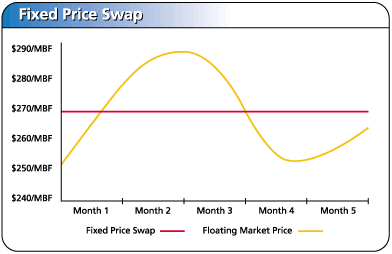 |
 Swaps are privately negotiated financial contracts in which two parties
agree to exchange, or swap, different price streams over a predetermined
period of time. They are financial over-the-counter instruments that can
be customized to meet a particular set of needs. Swaps can protect
against market price fluctuations by enabling producers and consumers to
lock in the price of raw materials and/or final product. By locking in
prices, companies gain control over variable costs and revenues inherent
in their businesses. There are no fees or premiums for a swap. Used in
concert with a physical contract, swaps effectively alter the price
structure of the contract - converting it from a floating price to a
fixed price, for example - and provide protection against adverse price
movements. In exchange for this protection, the ability to capitalize on
beneficial price movements is sacrificed. In short, the industry can use
swaps to eliminate price volatility, giving producers and consumers the
ability to manage margins and proactively offer customized pricing to
customers.
Swaps are privately negotiated financial contracts in which two parties
agree to exchange, or swap, different price streams over a predetermined
period of time. They are financial over-the-counter instruments that can
be customized to meet a particular set of needs. Swaps can protect
against market price fluctuations by enabling producers and consumers to
lock in the price of raw materials and/or final product. By locking in
prices, companies gain control over variable costs and revenues inherent
in their businesses. There are no fees or premiums for a swap. Used in
concert with a physical contract, swaps effectively alter the price
structure of the contract - converting it from a floating price to a
fixed price, for example - and provide protection against adverse price
movements. In exchange for this protection, the ability to capitalize on
beneficial price movements is sacrificed. In short, the industry can use
swaps to eliminate price volatility, giving producers and consumers the
ability to manage margins and proactively offer customized pricing to
customers.
The typical swap transaction involves the exchange of a
fixed price for a variable, or floating, price. Settlement is financial in
that cash changes hands; physical product does not. Each month during
the life of the transaction, the difference between the two prices is
determined and payment made to the appropriate party.
Swaps Help Lumber Company Lock in Profits Despite Uncertain Market Conditions
Lumber Co., a producer of WSPF, is interested in managing the price of
2x4s during the next nine months. The company is concerned that market
conditions could deteriorate more than expected and squeeze margins to
the point of jeopardizing the annual profit plan. To reduce this threat,
Lumber Co. enters into a swap with Enron, locking in its profit margin
with a price of $270/MBF on 1,000,000 BF per month of 2x4 WSPF, or 30%
of monthly production. This price gives Lumber Co. the margin and
confidence that the 2x4 production will meet its financial target.
During the Life of the Swap
- Lumber Co. continues to sell 2x4 WSPF to customers of its choice
at floating market prices.
- Lumber Co. and Enron exchange payments on a monthly basis equal
to the difference between the fixed price of $270/MBF and the prevailing floating price.
- For example, if the floating price is $220/MBF, Lumber Co. will
receive $50/MBF on 1,000,000 BF per month. However, if the floating
price is $320/MBF, Lumber Co. will owe $50/MBF to Enron.
- The net combination of the swap cash flow and cash flows related
to physical sales of 2x4 WSPF is a fixed amount of $270/MBF.
- Lumber Co. has stabilized a portion of their operating margin with
the swap, giving the company the ability to achieve key performance
targets.

Swaps can be based on a flat price or an escalating price.
|
How Swaps Protect Homebuilders From Rising Lumber Prices
Home Co., a national homebuilder, is preparing their annual budget. They
discover that the company's inventory cannot absorb increases in lumber
prices, but it is impossible for Home Co. to pass on lumber price
increases. On the other hand, customers don't necessarily expect lower
prices when lumber prices fall; they simply want to pay the agreed-upon
price for their house. To serve its customers while protecting its
margins, Home Co. enters into a 1-year price swap. This price effectively
fixes the price of 2x4 WSPF at $275/MBF on a monthly volume of 500,000 BF,
or 60% of anticipated monthly usage.
During the Life of the Swap
- Home Co. continues to purchase 2x4 WSPF from suppliers of its
choice at floating market prices.
- Home Co. and Enron exchange payments on a monthly basis equal to
the difference between the swap fixed price of $275/MBF and the
floating price for 2x4 WSPF.
- For example, if the floating price for 2x4 WSPF is $325/MBF in
a given month, Home Co. will receive $50/MBF on 500,000 BF. However,
if the floating price is $225/MBF, Home Co. will owe $50/MBF to Enron.
- The net effect of combining the swap cash flows with actual
purchases of 2x4 WSPF is a fixed 2x4 price of $275/MBF.
- The swap enables Home Co. to build with full confidence that the
margin on those homes is protected from fluctuating WSPF prices.
Disclaimer
 |





